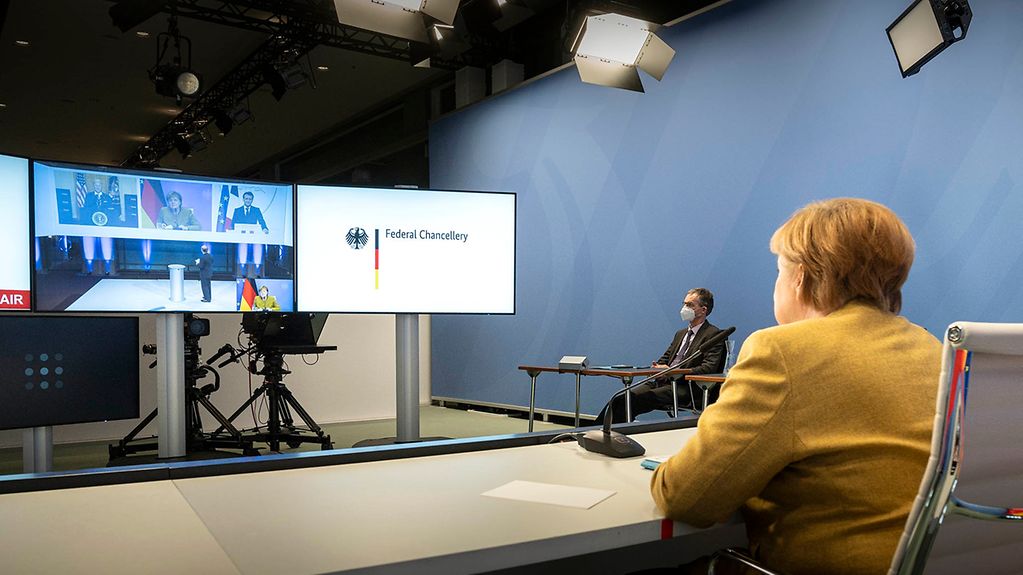The Chancellor at the Munich Security Conference
At the online Munich Security Conference, Chancellor Angela Merkel has outlined some important security policy challenges. She stressed that multilateralism should be the “foundation of our political activity” – and reaffirmed her commitment to the transatlantic partnership.
4 min reading time

Chancellor Angela Merkel attended the online conference from the Federal Chancellery.
Photo: Bundesregierung/Bergmann
As a result of the pandemic, the Munich Security Conference will be held in its traditional form later in the year. Today, however, an online conference provided an alternative platform for international diplomacy. Alongside Chancellor Angela Merkel, US President Joe Biden, French President Emmanuel Macron, British Prime Minister Boris Johnson, UN Secretary-General António Guterres and other high-ranking decision-makers attended.
We can only fight the pandemic together
Chancellor Angela Merkel underscored the fact that developments over the last year have clearly demonstrated how “important and right” it is to commit to multilateralism as the “foundation of our political activity”. This is becoming particularly obvious in our ongoing fight against the COVID-19 pandemic, she said. We can only fight it together. The virus, she pointed out, will only be beaten when everyone is vaccinated. That is why one of the main tasks of the international community is to “swiftly and fairly supply everybody in the world” with the vaccine. For that reason, at today’s G7 meeting, the Chancellor reported, Germany pledged another 1.5 billion euros to the ACT (Access to COVID-19 Tools) Accelerator and the COVID-19 Vaccines Global Access (COVAX).
The ACT (Access to COVID-19 Tools) Accelerator aims to develop, produce and ensure the fair distribution of COVID-19 vaccines, tests and treatments. COVAX (COVID-19 Vaccines Global Access) is the vaccine pillar of the ACT Accelerator. The initiative, which is led by the WHO, GAVI (The Vaccine Alliance) and CEPI (Coalition for Epidemic Preparedness Innovations), is working to ensure that vaccines are accessible and affordable for all countries.
The targets for climate action, biodiversity, the fight against global terrorism and the 2030 sustainable development goals (SDGs) can likewise only be achieved “ if we pool our forces in all fields” and if we understand security “as a concept of networked security, multidimensional security” said Angela Merkel.
Germany contributes a great deal to the transatlantic partnership
The Chancellor underlined that Germany is committed to achieving the 2 per cent target for defence spending that NATO adopted in 2014. But it is also a question of what Germany brings to the transatlantic partnership. For 18 years, Germany has been actively engaged in crucially important positions in Afghanistan. It is also willing to engage for a longer period “if this serves the successful mission and puts us in a position to give the democratic, peace-loving forces in Afghanistan a genuine chance”. Over and above this, Germany is a framework nation in Lithuania, as well as playing an active part in the fight against Islamist terrorism and in Iraq.
Relations with Africa of major strategic importance
Angela Merkel stressed that Germany is committed to NATO , which it sees as a “central transatlantic pillar” and to the European Security and Defence Policy (ESDP). NATO and the ESDP should not be seen as two separate things. “They complement one another and belong together.”
For the EU, some questions are “particularly important”, including engagement in Africa and the future of Syria. Relations with Africa in particular are of “such strategic significance” that this ought to be an important matter within the transatlantic discussion too, she said. The crux of the fight against Islamist terrorism must be seen to be developments in Libya. In spite of some achievements, we should “not be naïve” she said. Together, “we should work to ensure that Libya and its future belong to the Libyans”.
Transatlantic agenda via à vis Russia and China
Angela Merkel also outlined two major tasks for the transatlantic partnership: firstly, the development of a transatlantic Russia agenda, covering both offers of cooperation and also making “very clear where the differences lie”. The second is a common agenda on China. China has increased its global outreach – “and we as a transatlantic alliance and as the world’s democracies must have something to set against this”. This is currently true regarding vaccine supplies to developing countries and strengthening multilateral organisations.
We now need to define common strategic challenges and common approaches to address these. “I see the transatlantic partnership at the heart of these efforts,” said Angela Merkel. Germany is ready “for a new chapter in the transatlantic partnership”.
Because of the pandemic, the Munich Security Conference was held as a special edition this year. Find out more here.